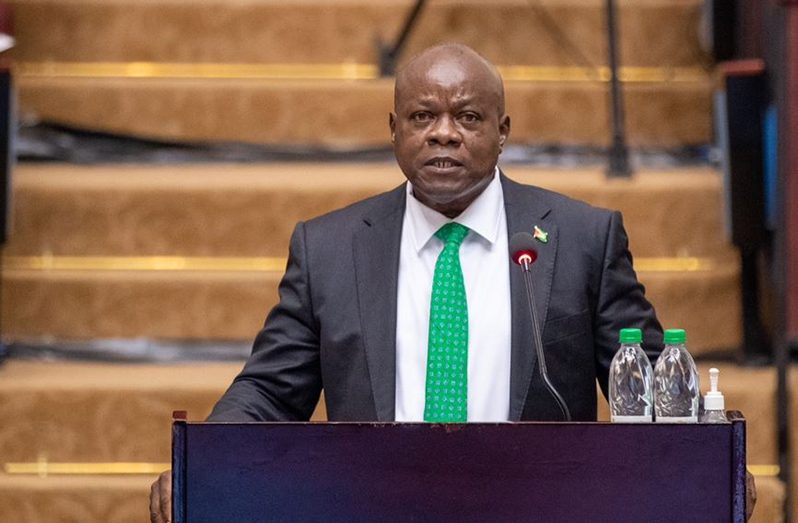-says an APNU gov’t could reduce VAT, create ‘high-paying’ jobs
A STRING of unsustainable welfare measures funded by reduced taxes and a list of plans and programmes already implemented by the government was all the Leader of the Opposition (LOO), Aubrey Norton had to offer as his alternatives to the government’s plans outlined in Budget 2023.
The penultimate speaker of this year’s budget debate, and the last Opposition member to make a contribution, he used his allotted time to address human resource development, poverty alleviation and reduction, the public service, infrastructure, oil and gas, and foreign policy.
However, Senior Minister with Responsibility for Finance, Dr Ashni Singh would later call out Norton’s “bloviation.”
“When he started out, I thought maybe he wanted to amuse us. I thought it was comedy. What we were treated to by Mr Norton was a timely reminder of why the people of Guyana decided that the APNU belongs in the opposition,” Dr Singh, who was the final speaker in the debate, commented.
According to Dr Singh, Norton invoked all manner of outdated concepts that were encountered during the 1970s and 1980s, when his party, the People’s National Congress Reform (PNC/R) was in government.
“[There was all] manner of lofty sounding words to impress people, but there was no substance beneath that,” Dr Singh said.
Speaking on poverty alleviation and reduction, Norton listed some 22 measures, including several that are currently being executed by government to target the elimination of early childhood illiteracy, job creation, the promotion of micro and small businesses, and increases in technical and vocational education training for the poor and vulnerable and public assistance.
Among these measures, was the promise of reduced Value Added Tax (VAT). He vowed to reduce the tax from 14 per cent to 12 per cent.
When the APNU+AFC reduced VAT from 16 per cent to 14 per cent, they insidiously added VAT to a number of commodities, including essentials such as water and electricity.
In outlining a raft of measures to mitigate the high cost of living, being caused by global factors, the Opposition Leader regurgitated many of the measures already identified by his colleagues during their contributions to the debate.
However, like his predecessors, Norton failed to show or explain how these measures would be financed or sustained, outside of depending on the oil revenue.
Norton told the house that the budget did not address cost-of-living issues.
” This budget is found wanting when it comes to measures aimed at addressing the high cost of living,” he said.
However, Dr Singh rubbished this claim and called out Norton for not proposing alternative measures.
“Instead of proposing alternative policies, programmes and initiatives, the APNU+AFC during this budget debate regurgitated the standard, overworked and tired diatribe which has been subjected to multiple rounds of scrutiny by Guyanese and which the Guyanese people rejected since March 2020 [when elections were held],” he said.
HIGH-PAYING JOBS
Norton suggested yet another 12 measures, including the removal of taxes on agro-processing and other manufacturing sectors. He also called for more oil and gas training, while simultaneously judging the yet-to-be constructed Port Mourant Oil and Gas Training Institute, which he called deficient.
Norton related that a government under his party, would create high-paying jobs by using university graduates to undertake an analysis of the country’s problems and craft solutions that will result in data-driven development.
Norton provided no details or clarity as to exactly how many sustainable high- paying jobs this would create, nor did he state how he came to the conclusion that government’s current development plans are not data driven.
Regarding foreign policy, Norton identified policies and measures that mirror existing programmes being executed by the current government.
Norton spoke of the need to create international relations that are conducive to Guyana’s development and would create an environment that will allow Guyana to progress. He said that this should be done while simultaneously pursuing a foreign policy strategy that gives us the environmental space to focus on oil and gas and sustainable development.
Despite never acknowledging the leadership shown by the government in marketing Guyana’s first REDD+ jurisdictional carbon credits in a deal that saw Guyana receiving at least US$750 million, Norton called for Guyana’s forest to not only be used in transactional terms, but also as a bargaining tool to allow us to develop our environmental space.
Norton also called for cheaper electricity, though he gave no specifics as to how this cheaper electricity would be arrived at. Again, this was another confusing position, given that the opposition is against the Wales gas-to-energy project which will bring natural gas to shore and slash electricity costs by more than half in the coming years.
Norton also called for duty-free concessions to be extended to a larger section of public servants, and for a $50,000 stipend to be given to UG students and those studying TVET to assist with transportation.
For the past two years the government has been making education at a number of institutions, particularly GOAL and the Cyril Potter College of Education (CPCE), available online to alleviate the need for students to travel.
Additionally, Norton called for improved auditing capacity, which is something that the government is already addressing.
“Our auditing capacity of both the GRA and Auditor General’s Office should be expanded until it is the envy of the oil-producing world,” Norton said.




.jpg)









